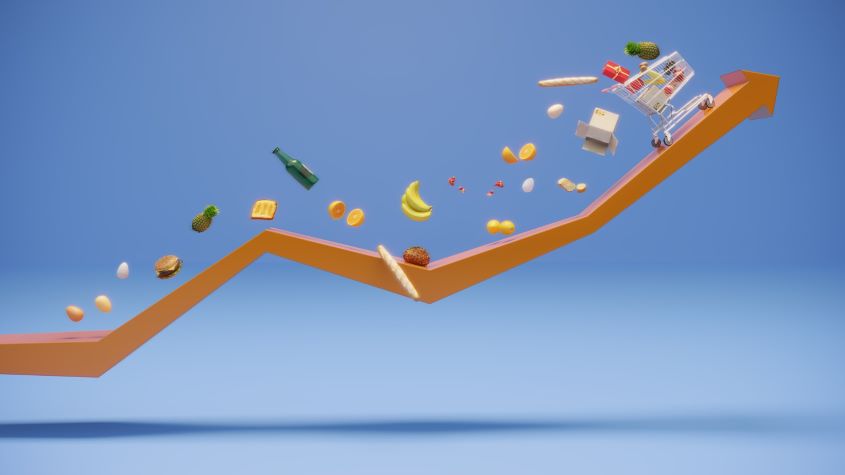Record food price rises keep inflation above 10%
The highest food price rise in 45 years has spurred inflation to remain above 10%


Get the latest financial news, insights and expert analysis from our award-winning MoneyWeek team, to help you understand what really matters when it comes to your finances.
You are now subscribed
Your newsletter sign-up was successful
Want to add more newsletters?

Twice daily
MoneyWeek
Get the latest financial news, insights and expert analysis from our award-winning MoneyWeek team, to help you understand what really matters when it comes to your finances.

Four times a week
Look After My Bills
Sign up to our free money-saving newsletter, filled with the latest news and expert advice to help you find the best tips and deals for managing your bills. Start saving today!
UK inflation remained in double-digits in March after it fell less than expected.
Consumer prices rose by an annual 10.1%, the Office for National Statistics said, down from 10.4% in February. Despite the government’s attempt to push inflation down, soaring food prices means inflation has not pushed inflation down. The price of food and non-alcoholic drinks jumped 19.1% in the month - the largest rise since August 1977.
While March’s figures are less of a shock than the surprise increase in February, it has stoked bets that the Bank of England will raise interest rates again in May.
MoneyWeek
Subscribe to MoneyWeek today and get your first six magazine issues absolutely FREE

Sign up to Money Morning
Don't miss the latest investment and personal finances news, market analysis, plus money-saving tips with our free twice-daily newsletter
Don't miss the latest investment and personal finances news, market analysis, plus money-saving tips with our free twice-daily newsletter
We look at what inflation means for you and your money.
What is driving inflation?
The largest contribution to the upped inflation rate came primarily from food and non-alcoholic beverages, alongside housing and household services - including electricity, gas and other fuels.
Experts have pointed out that food inflation is not budging in the same way as other sectors, with a one-month increase of 1.1%. Downward trends were identified in the housing and household services sector as well as restaurants and hotels.
Some of the food essentials that have shot up in prices are: olive oil - up 49.2%, low-fat milk - up 38.8%, cheese up - 33.6%, and eggs - up 32%.
Sarah Coles, head of personal finance, Hargreaves Lansdown said the high inflation figures are a consequence of “the decisions of food producers back when everything from energy to fuel, fertiliser and feed was impossibly expensive, so there are still supply issues.
“More recently we have seen the impact of shoppers cutting back, which is worth watching for. In this case, it’s the runaway price of milk which has encouraged people to take milk and dairy products off their shopping lists.
“As a result, there was a glut in the wholesale market, the supermarkets have been able to pick up some bargains, and we have seen the giants slash milk prices in recent days,” she said.
Today’s latest figures indicate inflation is more stubborn than that of other countries - the UK now has the highest inflation rate in western Europe, and it means we could see yet another rise in interest rates next month.
What’s next for inflation?
Last week, the International Monetary Fund forecast that inflation would average 6.8% in the UK this year - the highest of any major advanced economy.
"It's now clear the UK has an inflation problem that is worse and more persistent than in Europe and the U.S.," said Ed Monk, associate director of personal investing at asset manager Fidelity International.
One particular factor to remember is the inclusion of anomalous energy price data. Last year’s sharp energy price rises will soon drop out of the annual comparison, making it likely that inflation will drop naturally. The task of the Bank of England is to monitor and control how fast that fall will be.
Some metrics already point to this scenario - inflation on costs charged by manufacturers fell in March to 8.7%, down from 11.9% in February - its lowest since October 2021.
What does rising inflation mean for your money?
Inflation at 10.1% will continue to pose a challenge for mortgage holders, savers and pensioners alike, all while the wider property market faces a continued affordability crisis, but there are a few avenues of positivity.
While softening inflation is good news for savers as it means the value of their savings will improve, in real returns on cash savings will still be deeply negative.
“Thankfully, with savings rates edging up dramatically over the past year and inflation expected to slide by the fourth quarter, savers can start imagining a future where they actually make a gain in real terms,” she said.
She added now is the time to move money languishing in ultra-low interest rate accounts.
“Opting for a long-term fix may also be a wise move for those that want to ensure their money works as hard as possible if interest rates do edge down in the future. Remember, while a high-interest, easy-access savings account can be a great place to hold an emergency fund, it might not be the best storage facility for those with surplus money,” she said.
Sarah Coles, head of personal finance at Hargreaves Lansdown, echoes this view. She said if beating inflation is the primary consideration, “predictions that it could fall below 3% at the end of the year make a 1-year fixed rate at 4.5% and a 5-year fixed rate at 4.6% look like attractive prospects.”
State pensioners too should take heed of the ONS’ findings, said James Jones-Tinsley, chartered financial planner and SIPP technical specialist at Barnett Waddingham.
Those who claim the state pension will be “holding onto their sighs of relief, as inflation is yet to hit single digits,” he said, with figures expected in six months likely to be key to long-term policy surrounding the pensions triple lock.
Jones Tinsley said: “September’s inflation figure should, under the current policy, dictate the state pension for the 2024 tax year. Pensioners should be hoping for a return to a more feasible rate of inflation by then, to enable the Government to uphold the triple lock and secure a comfortable state pension increase next April.
“If inflation is still notably high, upholding the lock would look financially untenable. Of course, this is in the Government’s political best interest too; unless their hand is forced by the economic reality, they won’t want to make any changes until after a general election,” he added.
Get the latest financial news, insights and expert analysis from our award-winning MoneyWeek team, to help you understand what really matters when it comes to your finances.
Tom is a journalist and writer with an interest in sustainability, economic policy and pensions, looking into how personal finances can be used to make a positive impact.
He graduated from Goldsmiths, University of London, with a BA in journalism before moving to a financial content agency.
His work has appeared in titles Investment Week and Money Marketing, as well as social media copy for Reuters and Bloomberg in addition to corporate content for financial giants including Mercer, State Street Global Advisors and the PLSA. He has also written for the Financial Times Group.
When not working out of the Future’s Cardiff office, Tom can be found exploring the hills and coasts of South Wales but is sometimes east of the border supporting Bristol Rovers.
-
 Should you buy an active ETF?
Should you buy an active ETF?ETFs are often mischaracterised as passive products, but they can be a convenient way to add active management to your portfolio
-
 Power up your pension before 5 April – easy ways to save before the tax year end
Power up your pension before 5 April – easy ways to save before the tax year endWith the end of the tax year looming, pension savers currently have a window to review and maximise what’s going into their retirement funds – we look at how
-
 UK wages grow at a record pace
UK wages grow at a record paceThe latest UK wages data will add pressure on the BoE to push interest rates even higher.
-
 Trapped in a time of zombie government
Trapped in a time of zombie governmentIt’s not just companies that are eking out an existence, says Max King. The state is in the twilight zone too.
-
 America is in deep denial over debt
America is in deep denial over debtThe downgrade in America’s credit rating was much criticised by the US government, says Alex Rankine. But was it a long time coming?
-
 UK economy avoids stagnation with surprise growth
UK economy avoids stagnation with surprise growthGross domestic product increased by 0.2% in the second quarter and by 0.5% in June
-
 Bank of England raises interest rates to 5.25%
Bank of England raises interest rates to 5.25%The Bank has hiked rates from 5% to 5.25%, marking the 14th increase in a row. We explain what it means for savers and homeowners - and whether more rate rises are on the horizon
-
 UK inflation remains at 8.7% ‒ what it means for your money
UK inflation remains at 8.7% ‒ what it means for your moneyInflation was unmoved at 8.7% in the 12 months to May. What does this ‘sticky’ rate of inflation mean for your money?
-
 Would a food price cap actually work?
Would a food price cap actually work?Analysis The government is discussing plans to cap the prices of essentials. But could this intervention do more harm than good?
-
 Is my pay keeping up with inflation?
Is my pay keeping up with inflation?Analysis High inflation means take home pay is being eroded in real terms. An online calculator reveals the pay rise you need to match the rising cost of living - and how much worse off you are without it.
